Best hay for rabbits 2025 that your bunnies will love
Expert vets agree that the best hay for rabbits is essential for your bunny’s wellbeing
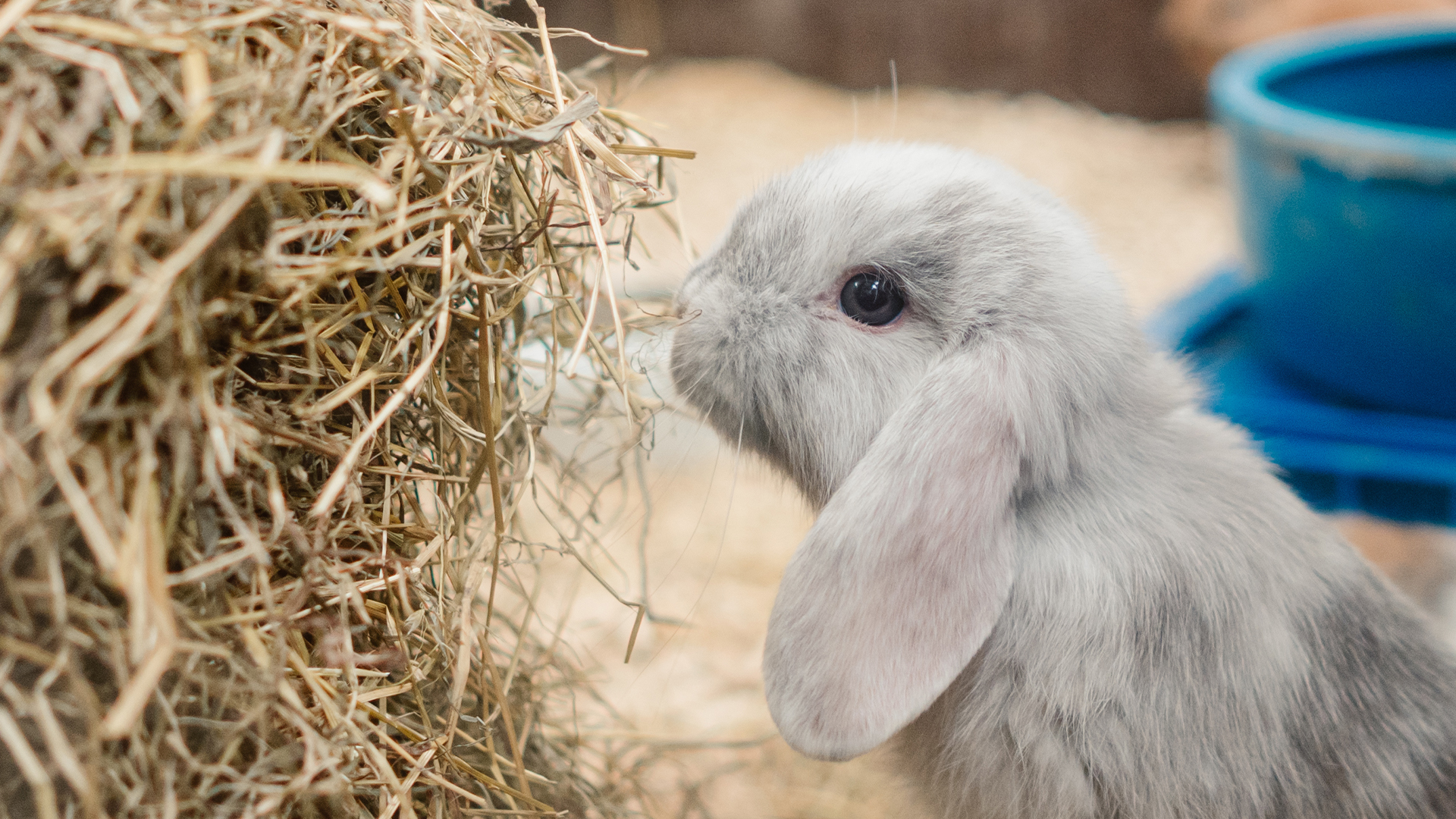
If you can get hold of the best hay for rabbits, then trust us when we say your bunny will really thank you for it. Hay is an absolute essential for these small pets because it forms the foundation of a healthy diet. Without it, your rabbit’s gut and digestive system can really suffer and you may find that your bunny develops dental problems, too.
“Hay or grass should make up the vast bulk of a rabbit’s diet – around 85% of what they consume each day,” says expert vet Rebecca MacMillan, who goes on to explain what to feed a rabbit. “A typical diet plan for a rabbit should consist of unlimited hay or grass which should always be available, throughout the day and night.” In that sense, hay or grass is far more important than even the best food for rabbits and the higher the quality you buy, the better it will be for your pet and the more likely they are to eat it.
So what should you look out for? Hay needs to be dry and clean so that you can be sure you’re giving your rabbit an abundance of fiber and protein while getting those teeth working. “Dusty, cheap, or old hay will be lacking in nutrients and could contain mold spores if not properly stored,” Dr MacMillan adds. She also recommends timothy or meadow hay saying it’s fresh and pleasant smelling. Let’s check out the best hay for rabbits.
Best hay for rabbits 2025
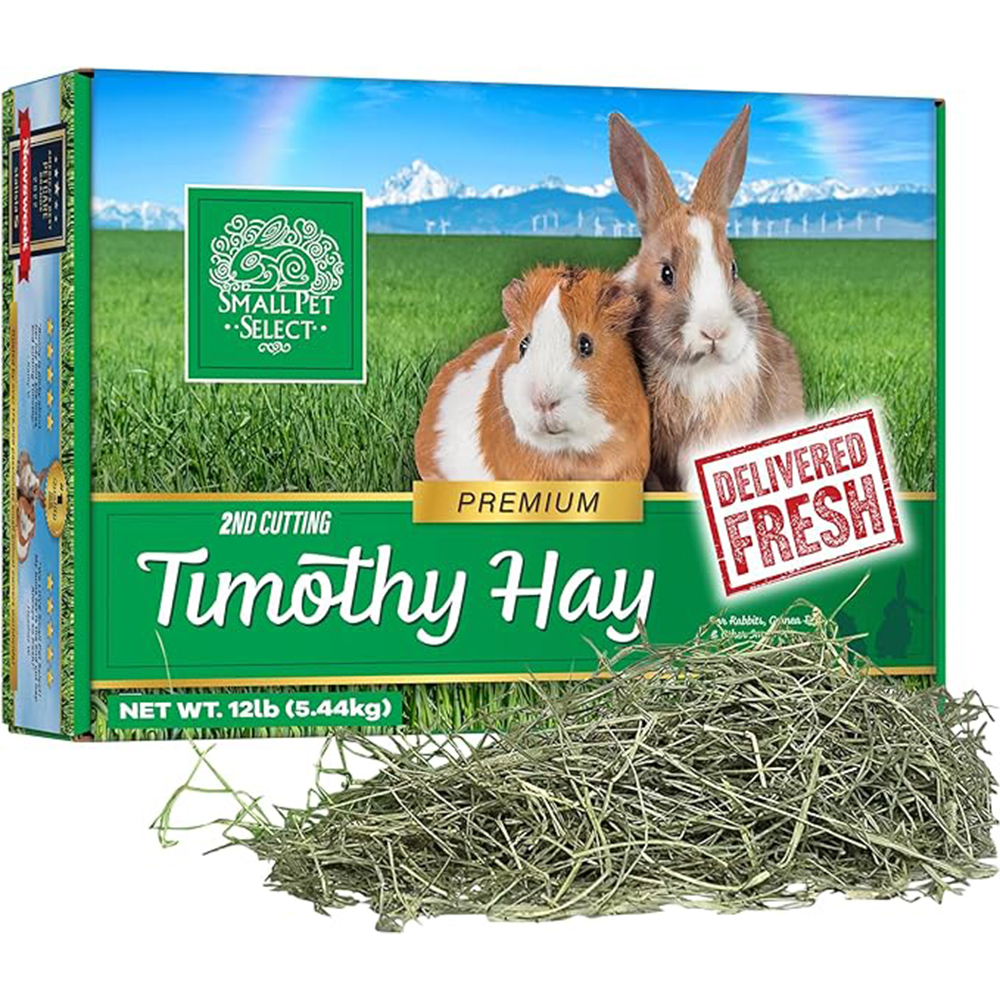
Best overall hay
This hay comes from the second cut – that means it will have been harvested later in the summer and will have less grass mixed in and fewer weeds. Second cuts tend to be younger, greener and softer with more leaves and, in this case, you will find flowery heads within the hay. That’s a good thing because it will encourage rabbits to munch away. The hay should also be packed with nutrients.
Figures show there’s a maximum of 34% crude fiber and a minimum of 8% crude protein in this hay and the company seeks to ensure it remains as fresh as possible. Each bag is packaged by hand rather than a machine which allows them to be inspected for shattered leaves and other signs of damage. As such, it comes highly recommended.
Reasons to buy: This high quality hay has been grown for small animals and its packed with nutrients.
Reasons to avoid: First cut hay is better for animals who need additional fiber and for those with dental problems.
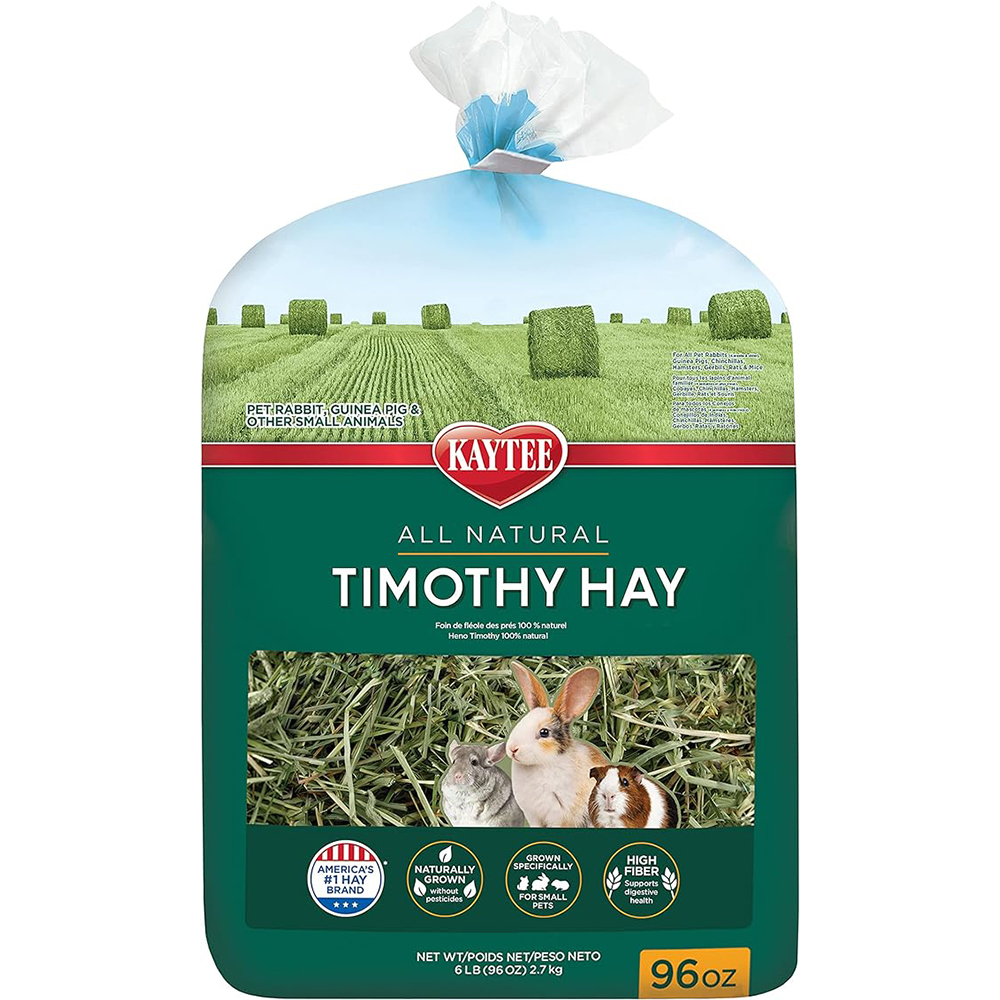
Best for fiber
Timothy hay is a staple food for rabbits but you want to ensure it’s fresh and natural. Kaytee’s large bags will provide you with an abundance of goodness an what you get is loads of hay grown entirely to feed our wonderful little pets without the use of pesticides and with no artificial preservatives.
The company says its hay is cultivated in fertile farmland in an area of the US that is blessed with sunshine. It is nourished using water from rocky mountains and the bales are selected by hand to ensure they’re of the utmost premium quality. The aim is to provide you with long strands and the ideal leaf-to-stem ratio.
This seems to be evident from what can be seen within each large resealable bag and we were reassured that our rabbits would benefit from the hay’s high fiber. Figures on the back of the pack show it contains 32% crude fiber.
Reasons to buy: The hay is entirely natural and well cared for both as it’s grown and during the process of getting it to you.
Reasons to avoid: There have been a small number of online reviews from some buyers suggesting some of the hay has arrived brown.
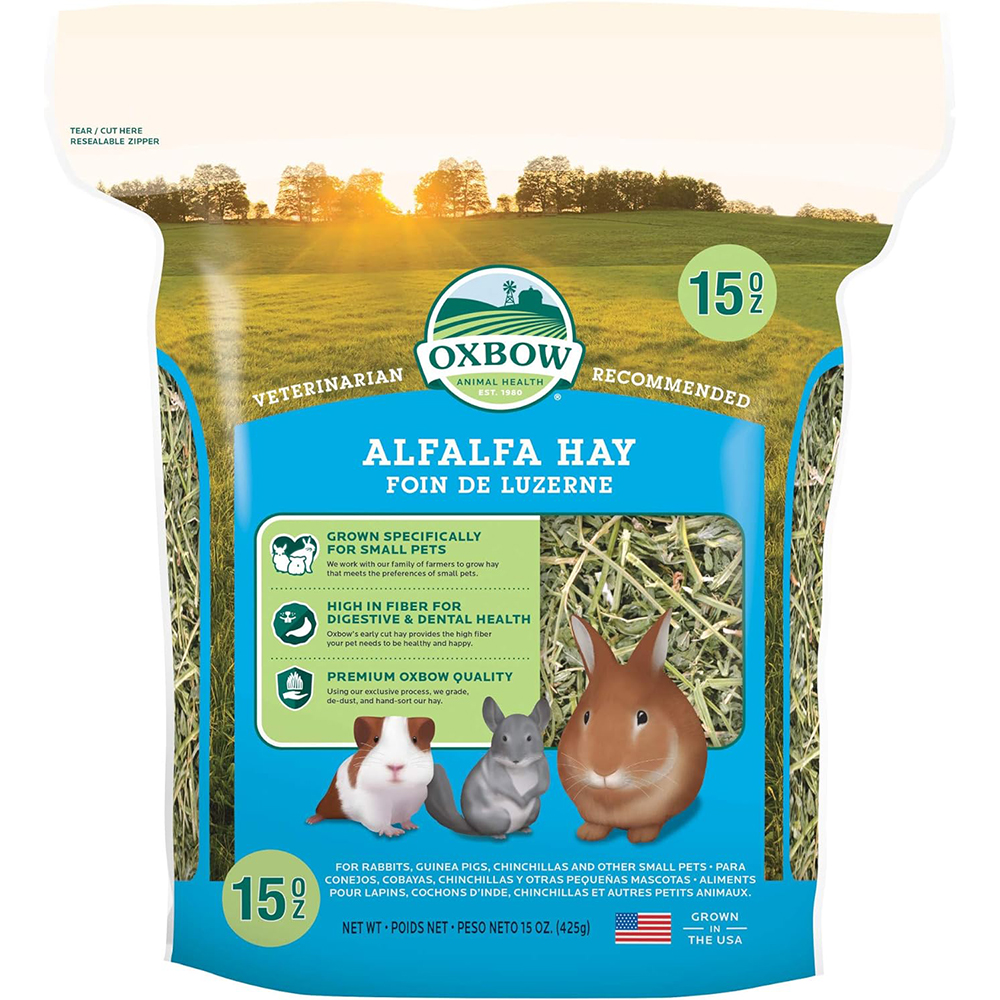
Best alfalfa hay
If you’re looking for alfalfa hay because you want your rabbit to consume more protein and calcium (bearing in mind that too much calcium can cause urinary stones), then this bag from Oxbow is certainly worth considering. Particularly well suited for rabbits who are growing, pregnant or nursing, it offers a sweet, inviting taste together with a satisfying crunch. Rabbits tend to love it.
This hay is grown in the US specifically for tiny pets and it’s graded and hand-sorted prior to packaging. As part of the process, the company says it looks to extract any dust so what you’re left with is a thick, good-smelling, fresh feeling, high-fiber hay that is going to be good for your bunny’s teeth too.
Reasons to buy: A hay that will be great to use if you have young rabbit or one who is pregnant.
Reasons to avoid: It’s not generally suitable for mature rabbits who should only eat small quantities of this hay.
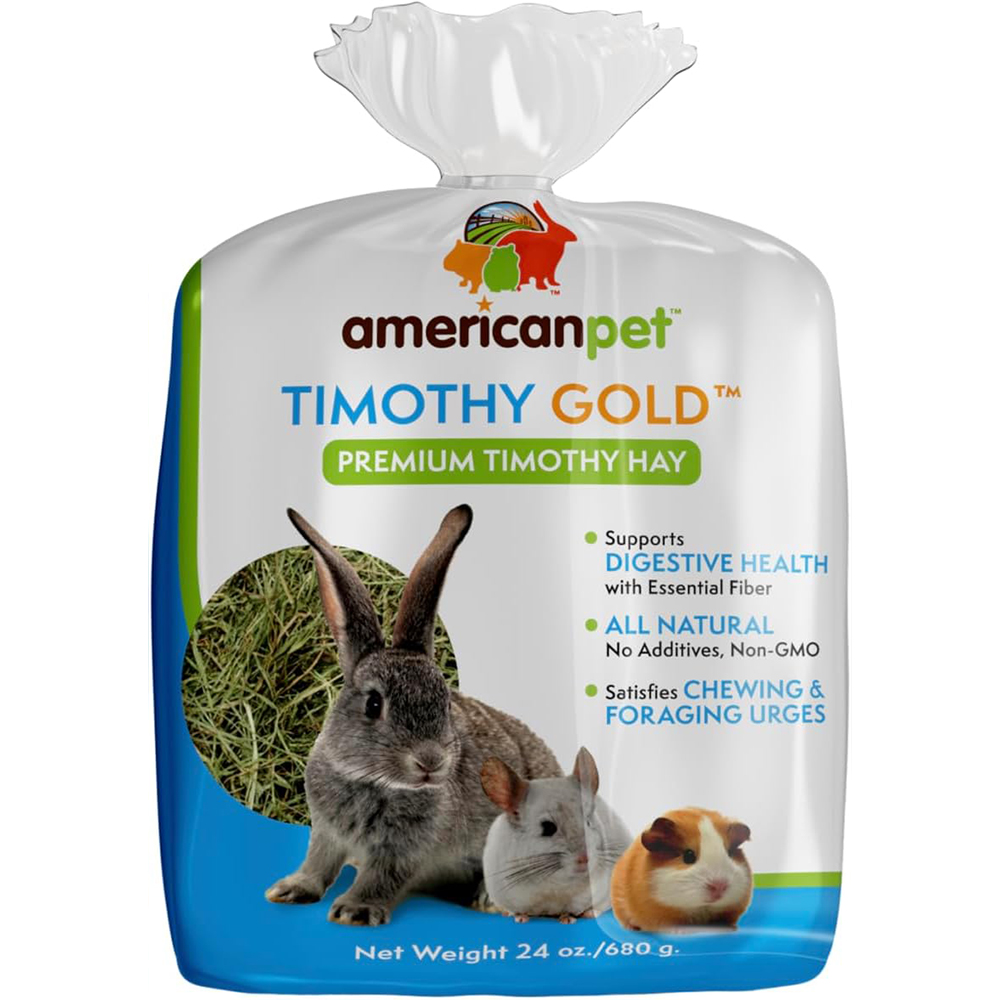
Best for saving money
This timothy grass hay promotes itself as being good for the digestive and dental health of your rabbit and with 30% crude fiber, you can’t really go wrong. As you’d expect, there are no additives nor any genetically modified organisms in this hay and buyers generally say their rabbits take to it well.
To help cut costs and ensure you have a plentiful ongoing supply, this is among the hay that you can buy on a “subscribe and save” basis on Amazon. It’s always worth looking for this feature and, in this case, you’ll knock off 5% until you’ve had five products delivered, at which point the discount is 15%. If budgeting is an issue, then this is something that may well sway you.
Reasons to buy: A premium timothy grass hay that can be bought relatively inexpensively if you take out a subscription.
Reasons to avoid: Although enjoying favorable reviews overall, there have been reports of bags containing small grass pieces and dust.
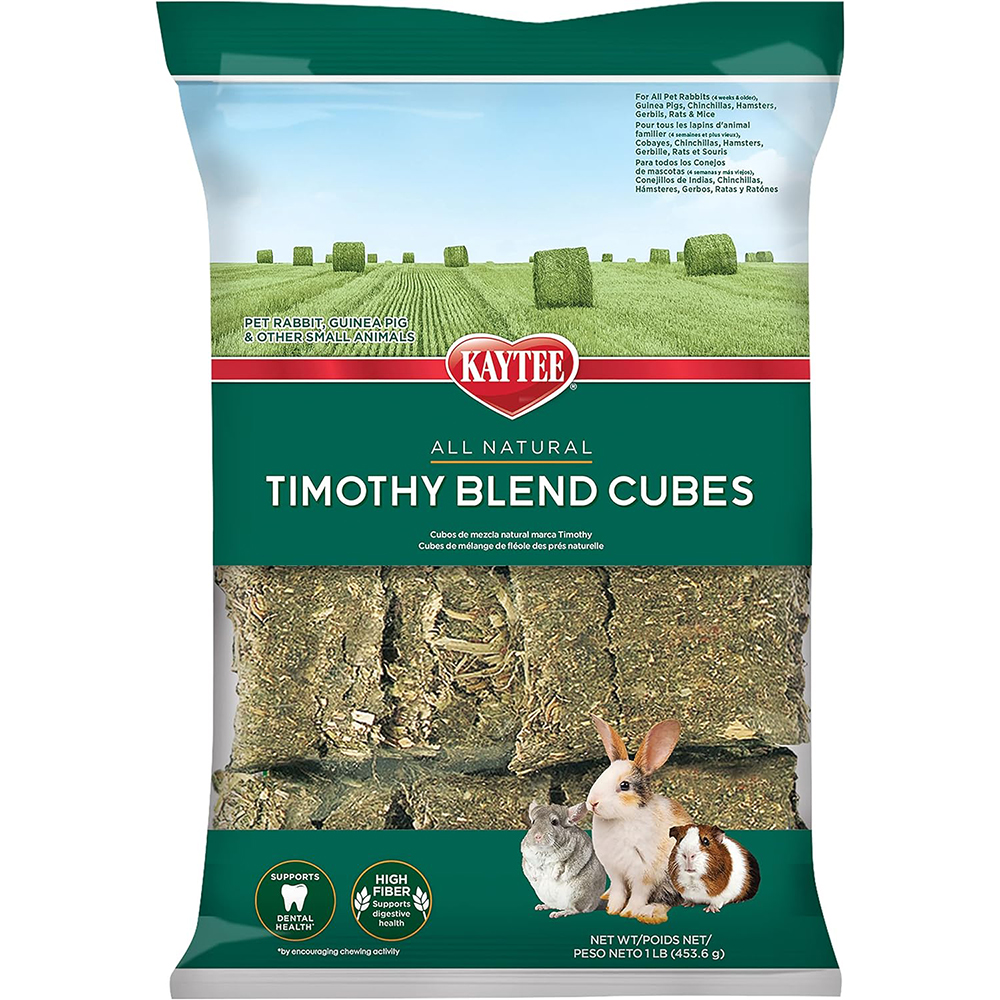
Best for treats
Rather than buy bags of loose hay, why not consider giving your rabbits these compacted cubes instead? A blend of suncured Timothy and alfalfa, they’re primarily created to be eaten as delicious treats and because they are in compressed blocks, they encourage bunnies to chew, which can help to keep their teeth in good shape.
As with other Kaytee hay, these blocks are grown without the use of pesticides and there are no artificial preservatives. But you will need to buy these cubes in addition to regular hay because they’re not going to be of use lining the floor of a hutch. And you’ll need to be a little careful given there is no calcium information on the bag – you don’t want to give a rabbit too much.
Reasons to buy: The cubes are great for a rabbit’s teeth and they are very handy to give your bunny as a treat to keep them busy.
Reasons to avoid: The product is advertised as being timothy hay but closer inspection shows it includes alfalfa hay as well – bringing additional calcium.
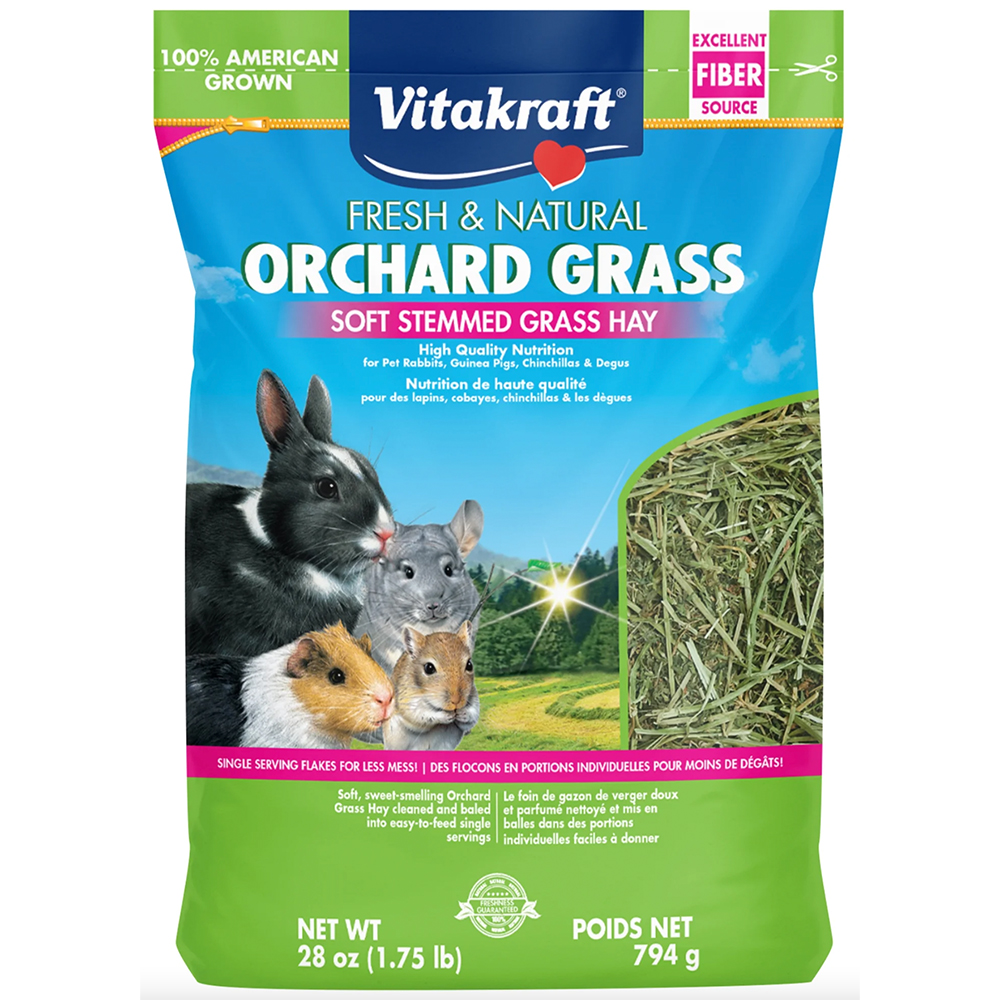
Best for chewing
Orchard grass is thinner than other grasses but it’s packed with fiber so it’s ideal if you want to keep your bunny’s tummy in tip-top shape. Use it if your rabbit has stomach ache or constipation and you’ll go some way to resolving the problem. It’s also worth using if you need a textured food to promote chewing.
With Vitakraft’s soft-stemmed orchard grass, you’re getting a fine all-natural product that is entirely grown in America, free of pesticides and anything artificial. To ensure quality, the grass is hand-selected and harvested and, for convenience, it’s packed into compressed bales which help to maintain freshness. This enables you to perfectly control portion sizes and, because the bag can be resealed, you can ensure the rest of the pack is kept fresh.
Reasons to buy: This high-fiber grass hay is high in fiber and it will also promote natural chewing.
Reasons to avoid: As with the Timothy cubes, you’re not going to be using this hay to line the floor of your rabbit hutch.
How we chose the best hay for rabbits
Buying hay is a little more complicated than it first appears and there are some things that need to be kept in mind. First and foremost, the hay needs to be fresh – if it is dry, smells sweet and doesn’t appear to show signs of dust and mold, that would certainly pass the test. The hay also needs to be of good stock so we paid attention to how it is harvested. We were wary of hay that has been sprayed with pesticides and any that had artificial preservatives added.
What do vets recommend as the best hay for rabbits?
“Feeding rabbits is actually very straightforward,” Dr MacMillan says. “They need a diet that is made up of predominantly grass and this can be in its dried form of hay or eaten fresh from the ground in your garden.” The key thing is to look out for hay that is high in fiber. “Rabbits have adapted to consume a high-fiber diet, which helps to keep their teeth worn down and their digestive system in good working order.”
There are a few types of hay that you can feed rabbits:
Timothy hay: In general, lower-calorie, coarser timothy hay is seen as the go-to product for rabbits because it’s great for digestion and teeth.
Meadow hay: This is usually cheaper, packed with fiber and low in sugar and it makes a great alternative.
Alfalfa hay: This can play a role in supporting development and growth thanks to its higher calcium and protein content but it’s not recommended for long-term use.
Oat hay: This is high in fiber but it’s also high in calories and can cause obesity.
Teff grass hay: This lacks sufficient protein and calcium.
What type of hay should be avoided?
You don’t need to entirely avoid any particular type of hay. Yes, there are issues with teff grass, oat hay and alfalfa hay, for instance, but you’d just need to moderate them – that’s not really the case with timothy hay and meadow hay, though.
It’s also absolutely fine to find grass from your garden as Dr MacMillan has suggested but you’ll need to get out on the lawn with some scissors to gather it up. “Never give your bunny any mown grass or grass clippings,” she warns. ”Lawnmowers damage the grass and warm it up, meaning bacteria can multiply on it potentially making your pet sick.”
If you’re venturing into the garden, it’s also worth pointing out that you should be wary of plants that are poisonous to rabbits.
“Bulbs (including daffodils, tulips, and bluebells) are toxic to rabbits, as are holly, ivy, yew, foxgloves, and primroses. Keep your rabbit away from these plants or remove them from your garden. Make sure that all houseplants are well out of reach from inquisitive rabbits, too.”
Do I need to limit the amount of hay I feed my rabbit?
If it’s timothy hay or meadow hay, no. Give them as much as you can.
“The exact amounts that a rabbit eats daily will vary depending on size and age,” says Dr MacMillan. “Hay and grass should be unlimited, so you won’t need to measure this out. Just replace it with fresh hay regularly.”
And don’t worry. A rabbit won’t gobble down hay like it’s going out of fashion. “Rabbits are grazers meaning they will eat for many hours of the day and at any time, but they tend to be most active in the mornings and evenings,” Dr MacMillan says.
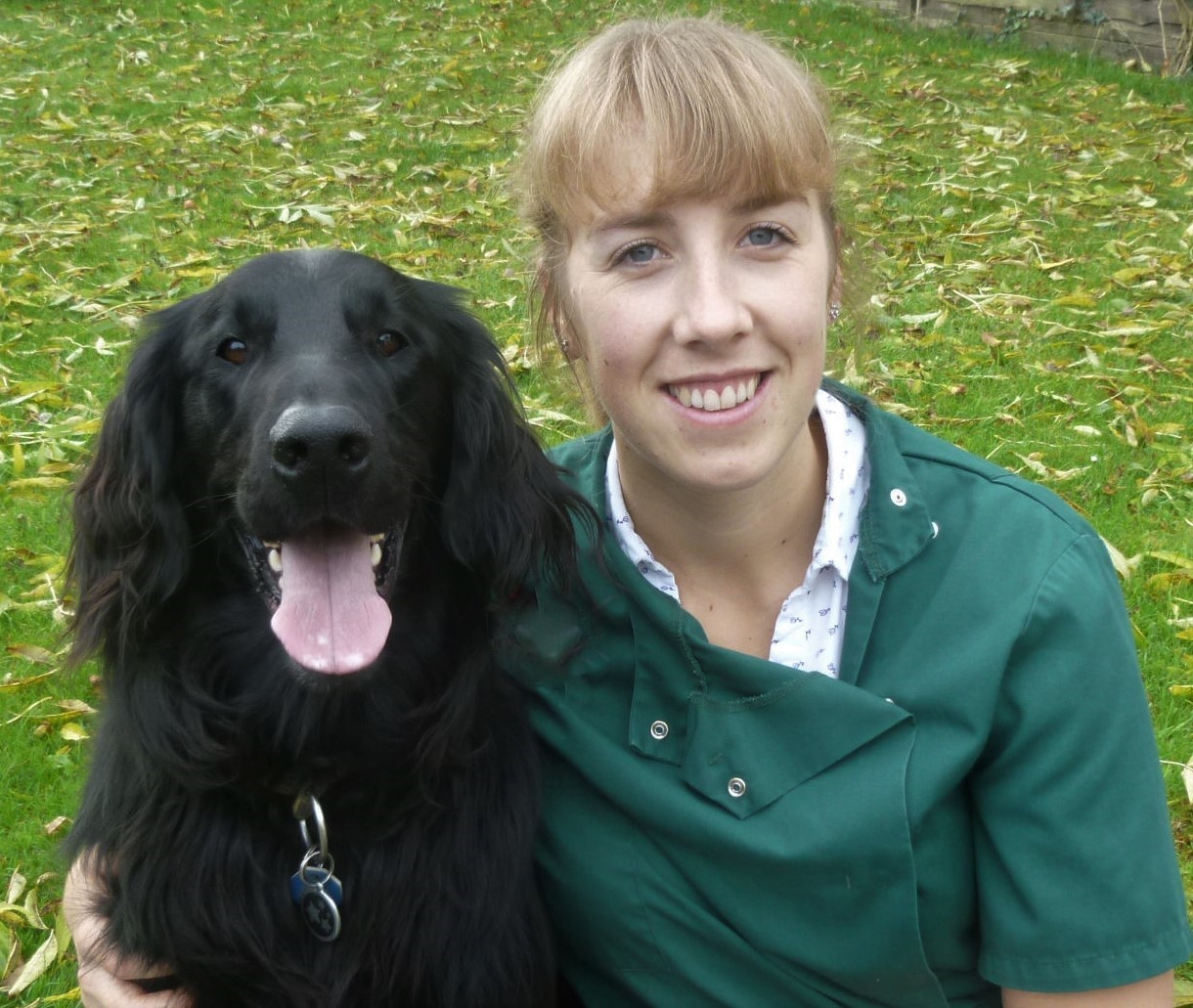
Dr Rebecca MacMillan is a companion animal vet who has always had a passion for writing and client communication. She works in the South West and loves complex medical cases.
Get the best advice, tips and top tech for your beloved Pets

David Crookes has been a journalist for almost 30 years and he has written for a host of magazines, newspapers, websites and books including the World of Animals Annual, BBC Earth, Live Science, The Independent and Tom’s Guide.
Born in England, he lives with two cats but he’s also keenly interested in the differences between the huge number of dog breeds – in fact, you can read many of his breed guides that he’s written in collaboration with vets here on PetsRadar.
With a lifelong passion for technology, too, he’s always on the lookout for useful devices that will allow people to keep their pets happier and healthier, and provide them more time to spend together.
David has a degree from Durham University, as well as postgraduate diploma in journalism from the University of Central Lancashire.
